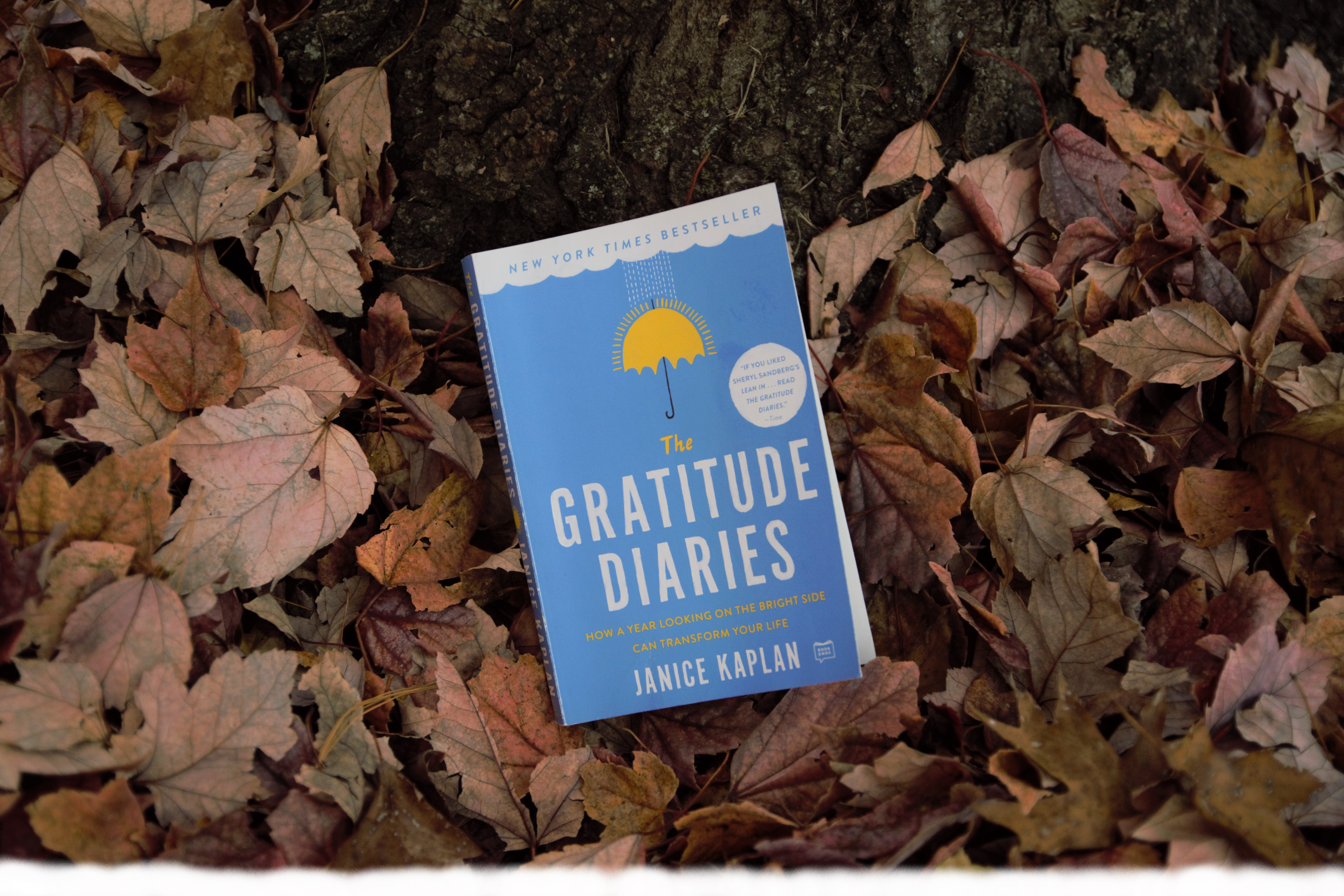Better Living Through an
Attitude of Gratitude

12 November 2019 | Theme: Gratitude | 7-Minute Read | Listen
Living in an attitude of gratitude improves. . . Everything.
That’s a pretty bold statement, but scientific research backs it up: practicing gratitude leads to improved psychological and physiological health, better relationships, and greater overall happiness. Even more, feelings of gratitude cause us to become open to experiencing ever increasing levels of gratitude and happiness.
Gratitude is an acknowledgement of what already is. Nothing external needs to change for us to cultivate a feeling of gratitude. We don’t need more stuff, more prestige, more friends, or a better life—whatever we have, wherever we are, we can find something for which we are truly grateful. Right Here. Right Now.
Not that it’s always easy. As Janice Kaplan explains in her book The Gratitude Diaries (which I’ll review next time), it’s human nature to focus on the negative. She uses an illustration given by psychologist Paul Rozin: if you have a bowl full of cherries that just happens to have one tiny cockroach, you’re going to notice the cockroach and the bowl of cherries is pretty much ruined. But a single cherry does nothing to improve a bowl of cockroaches. So if you hear ten compliments and one “suggestion for improvement,” you aren’t likely to lie in bed that night reliving all those compliments. Nope—you’re going to replay the tape in your head of that one place where you fell short. (Admit it: the first thing you saw in the picture above was that bug, right?)
Yet finding the things—even small ones—for which we can express gratitude is vital to living a happy, fulfilling life. And we don’t have to wait for a feeling of gratitude to wash over us—we can consciously call up gratitude. According to HappierHuman.com, writing in a gratitude journal for just five minutes a day can increase long-term well-being. The emotions felt during the five minutes of active journaling trigger a more grateful mood overall, and, according to UCLA’s Mindfulness Awareness Research Center, “changes the molecular structure of the brain, keeps the gray matter functioning, and makes us healthier and happier.”
Don’t know what to write about? That’s OK, because even the act of thinking about what to write is beneficial! According to Dr. Alex Korb, “Trying to think of things you are grateful for forces you to focus on the positive aspects of your life. This simple act increases serotonin production in the anterior cingulate cortex.” So the mental search itself helps produce the brain chemical that improves sleep, mood, and metabolism.
Gratitude also increases the production of the feel-good brain chemical dopamine. Once triggered, the brain says, “I’ll have more of that!” so it’s looking for more ways to feel gratitude. Thus, we train our brains to see things for which we feel grateful. Hebb’s Law states “neurons that fire together wire together”—so as Carrie Clarke writes, “the more you’re grateful for, the more you’ll find to be grateful for.”
I’m going to interrupt all this feel-good information with an acknowledgement that it isn’t at ALL helpful, when someone is in shame or despair, to tell her, “Just look on the bright side!” That feels glib and without empathy. That certainly isn’t my intention in writing this. We humans sometimes experience real pain, and sometimes we need professional help to overcome it. No amount of optimism can, for example, remove a woman from an abusive relationship. To imply otherwise would be victim shaming. It would be irresponsible and dangerous. If you’re in that kind of situation, please seek out the guidance of a true professional.
But if you’re stuck in a rut of complaining about the weather, your job, the kids, etc., you truly will benefit by practicing gratitude.
In addition to the mental aspects of greater sense of well-being, positive emotions, resilience, and happiness, practicing gratitude also has proven physiological benefits. Stimulating the hypothalamus, gratitude can improve eating, sleeping, stress management, digestion, weight regulation, heart rate, blood pressure, fluid and electrolyte balance, body temperature, and more. According to Derrick Carpenter, people who regularly practice gratitude have stronger immune systems. And an article in Happier Human states that gratitude can extend your lifespan by months or even years. Happier Human summed it up: “If you want to improve your health, improve your mind.” Evidence from 137 studies backs up that claim.
And the benefits don’t end there! Being grateful also improves relationships, both at home and at work. It stands to reason that expressing gratitude to others will improve communication and positivity in the relationship. Thus, in personal relationships, appreciating a partner, child, or family member strengthens loving bonds, and can make it easier to make, retain, and deepen friendships. In business, expressing gratitude can make you a better leader, collaborator, decision maker, and networker.
Gratitude is NOT flattery—it’s a genuine expression of appreciation for someone else’s actions or efforts. It is NOT transactional—it isn’t saying thank you to “get” something from the other (that’s manipulation). It isn’t weakness, subservience, or indebtedness. In fact, expressions of gratitude demonstrate an understanding that others have helped us get where we are, which fosters good will. When expressed clearly and from the heart, gratitude makes all the difference.
I learned from my daughter’s Suzuki violin teacher how to show appreciation in a way that matters, and Carol S. Dweck’s Mindset book validated it for me. Instead of telling my daughter, “That was great, now let’s move on,” he’d say, “I noticed that you kept your pinky over the E string that entire passage. It looked so pretty! Can we try the next passage and see if you can do it again?” Specific, moderate praise went farther to motivate her than an effusive, generalized comment would have. You’d better believe that when she played the next passage, she was concentrating on that pinky!
So being specific about the things for which we are grateful and communicating those things to another person can foster goodwill. It makes us—and them—feel good, and according to Dr. Martin E. P. Seligman, the improved mental state can last up to a month after one particular practice—for the person expressing the gratitude!
That’s a lot of profit from simply shifting perspective!
With all this good news about the benefits of a “gratitude practice,” Dear Reader, you may be wondering what you can do. Next week, I’ll explore some specific actions that you may want to consider. Meanwhile, I hope you’re keeping a journal and responding to the prompts that are live on Facebook each morning. Even if you can’t do it every day, you can still benefit by exercising those gratitude muscles two or three times per week. You can sign up to receive the Saturday Summary, which includes the next week’s prompts, by clicking on the link in the comments.
I’m so glad you’re here!
Until next time,

Resources:
“31 Benefits of Gratitude: The Ultimate Science-Backed Guide.” Happier Human, 19 Aug 2019. https://www.happierhuman.com/benefits-of-gratitude/
Carpenter, Derrick, MAPP. “The Science Behind Gratitude (And How It Can Change Your Life).” Happify Daily, nd. https://my.happify.com/hd/the-science-behind-gratitude/
Clarke, Carrie D., JD, ACC. “How Gratitude Actually Changes Your Brain and is Good for Business.” Thrive Global, 7 Feb 2018. https://thriveglobal.com/stories/how-gratitude-actually-changes-your-brain-and-is-good-for-business/
“Gratitude.” Psychology Today, nd. https://www.psychologytoday.com/us/basics/gratitude
“In Praise of Gratitude.” Harvard Health Publishing, 5 June 2019. https://www.health.harvard.edu/mind-and-mood/in-praise-of-gratitude
Sargis, Robert M., MD, PhD. “An Overview of the Hypothalamus: The Endocrine System’s Link to the Nervous System.” Endocrine Web, 2019. https://www.endocrineweb.com/endocrinology/overview-hypothalamus
If you enjoyed this article,
please share on social media!
NEXT ARTICLE

Book Review: The Gratitude Diaries by Janice Kaplan
19 November 2019 | Theme: Gratitude | 6-Minute Read